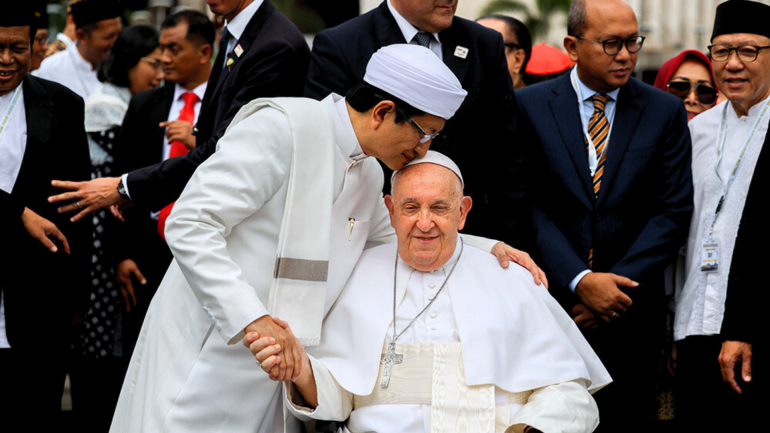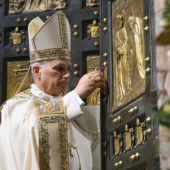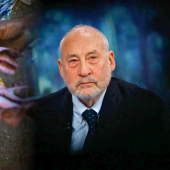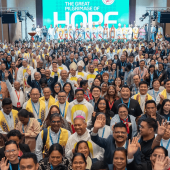Francis’ Papacy: A Breath of Fresh Air

Francis was a breaker of glass ceilings, a showstopper, a gender bender, and a game changer.
When Cardinal Jorge Mario Bergoglio of Buenos Aires stood on the balcony of St. Peter’s in Rome after being elected pope on March 13, 2013, he told the cheering crowds that the cardinals of the Roman Catholic Church had “gone to the ends of the earth” to find the new pontiff. He was a man from the periphery, and during his twelve years as pope, he put people on the peripheries at the heart of his papacy of inclusivity.
Of all those on the margins, Francis paid special attention to women. He made significant appointments of women to top positions at the Vatican—roles previously reserved for men. In January 2025, he appointed Sr. Simona Brambilla as the Prefect of the Dicastery for Institutes of Consecrated Life and Societies of Apostolic Life, with a cardinal serving under her as pro-prefect.
The decision was contested because some Vatican departments make binding decisions in the name of the pope and thus share in his power. Therefore, their heads should be ordained. Since Brambilla is technically a laywoman—as nuns are not clergy—critics claimed that certain decisions issued under her name could be considered invalid. However, Francis had already taken steps to distance Holy Orders from governing authority in the Roman Curia through his 2022 apostolic constitution Praedicate Evangelium which reformed the Curia.
Shortly after being hospitalized in February 2025, he announced the appointment of Sr. Raffaella Petrini as head of the Vatican Governorate—a role that, while not officially the head of a dicastery, nonetheless made her the most powerful woman in the Vatican.
Sr. Raffaella was the first-ever female Secretary General of the Vatican City State, responsible for the territory’s healthcare system and police force. Francis made appointments that had been closed for centuries. This historic reform of the Roman Curia—allowing lay men and women to lead Vatican offices traditionally reserved for cardinals and bishops—was an important first step in creating a synodal Church where all the baptized share in its mission and governance.
At the Synod on Synodality, for the first time in Church history, women, laymen, and bishops deliberated and made decisions together, moving the Church towards a new model of being. It is worth noting that Sr. Maria Nirmalini A.C., President of the National Conference of Religious India, attended the Synod, representing around 130,000 religious in the subcontinent.
Francis introduced important reforms. These were not merely organizational changes but strong statements about the nature of the Church as the People of God journeying together. He put in place new rules mandating all dioceses to establish systems for reporting abuse and cover-ups, and he oversaw extensive revisions to canon law to compel bishops to act against priests who abuse minors and vulnerable adults.
He appointed eight cardinals from around the globe to advise him on Church governance and curial reform. Several of them had previously been outspoken critics of curial dysfunction and the Church’s mishandling of sex abuse. Their activism was a sign of things to come—bold reforms that would involve more laypeople, men and women, participating in synods, first with speaking rights and later with equal voting power alongside cardinals and bishops.
Francis’ powerful symbolism when he broke with tradition to wash the feet of women prisoners during a Holy Thursday service in 2013—challenging centuries of exclusionary practice—spoke more eloquently than words. He was known for his conciliatory approach to LGBTQIA+ issues, which won him widespread acclaim in the West. He famously signaled a new tolerance of gay priests.
During an in-flight press conference on his return from his first papal trip—World Youth Day in Rio de Janeiro—he was asked about reports of gay priests in the Vatican. He replied, “If a person is gay and seeks the Lord and has goodwill, who am I to judge?” This response became a defining theme of a papacy marked by mercy rather than judgment. He also met with transgender people on several occasions. Francis said, “Being homosexual is not a crime. It is not a crime.” He called laws that criminalize homosexuality or homosexual activity “unjust” and urged Church members, including bishops, to show “tenderness,” as God does with each of His children. His 2016 apostolic exhortation, Amoris Laetitia, cautiously paved the way for the readmission of divorced and remarried Catholics to sacramental life.
Francis was also, in many ways, a highly polarizing figure. While many hailed his papacy as a refreshing change, others fiercely opposed his reforms, his inclusion of LGBTQIA+ Catholics, and his perceived relaxation of strict teachings on divorce and remarriage. Outrage erupted when the Dicastery for the Doctrine of the Faith published Fiducia Supplicans in December 2023, allowing priests to bless “couples in irregular situations and same-sex couples” outside of a liturgical framework—without “officially validating their status or changing in any way the Church’s perennial teaching on marriage.”
This prompted an extraordinary backlash from some cardinals, who said the document had caused “grave disorientation and confusion.” Bishops in Africa openly protested the document—and in an unprecedented reversal the following month, the pope agreed to exempt Africa from the practice.
Leading and animating around 1.4 billion Catholics worldwide is no small task—and he did it magnanimously and humbly. He demonstrated exemplary behavior. He brought a refreshing and deeply pastoral presence to the papacy, emphasizing mercy, dialogue, and accompaniment, and renewing the Church’s focus on serving the most marginalized.
At his passing, rather than mourning, we should celebrate the life and ministry of this marvelous and humble human being—a great disruptor who challenged every entrenched discourse. He was a breaker of glass ceilings, a showstopper, a gender bender, and a game changer… who, most of all, listened to people and their questions. Every question does not have an immediate solution, but he had the patience and humility to listen to all.
Pope Francis, I salute you. May your tribe increase!
(Noella de Souza MCJ, a Catholic nun belonging to the Order of the Missionaries of Christ Jesus, has over 45 years of experience in education. She is also a psychotherapist and counselor.)
Radio Veritas Asia (RVA), a media platform of the Catholic Church, aims to share Christ. RVA started in 1969 as a continental Catholic radio station to serve Asian countries in their respective local language, thus earning the tag “the Voice of Asian Christianity.” Responding to the emerging context, RVA embraced media platforms to connect with the global Asian audience via its 21 language websites and various social media platforms.














